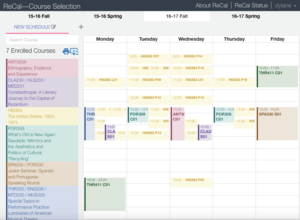The registrar will soon be releasing fall course offerings. Even as spring semester continues full speed ahead, many juniors are beginning to think about the coming year. Especially for A.B. seniors, who take only six classes, the questions of which to take, how many to take, and how to balance them with a thesis and post-graduation plans, all loom. Remembering how I, as a second semester junior, relied on advice from outgoing seniors, I decided to compile some of my own reflections on approaching coursework in senior year.
Three-three or four-two? For most A.B. students, senior year is the only time we take six courses, rather than eight or nine, to make more time for independent research. We may divide these courses in two ways: three each semester; or four in the first, two in the second. This decision may come down to a number of factors, including: your ability to plan ahead and pace your work, your spring extracurricular conflicts, and your research requirements (for some, scheduling lab work is an important consideration). Personally, I am so grateful for my decision to take four and then two. Especially since I have two theses — one for the Spanish and Portuguese concentration, and a thesis play for the theater certificate — I appreciate the lighter course load.
Final requirements? As you select final courses, narrowing down the choices can seem impossible. Before you make any decisions, first consult your departmental, certificate, and distribution requirements. Many departments have advising tools and calendars to help keep you on track. If you have any prerequisites left, check if these courses are only offered one semester. Senior fall, for instance, was my last opportunity to take ANT 300, a requirement for the Ethnography certificate. Having this in my schedule helped me limit my other choices.

Thesis-related courses? Finding a class that is at least tangentially related to your thesis may help you incorporate new perspectives into your research. For example, my thesis on art therapy in Rio de Janeiro requires that I delve into early 20th century psychiatric history. At the time, eugenics — the belief that people with desirable blood should procreate, whereas people with “degenerate” blood should not — was a mainstream psychiatric belief, used to justify long-term internment in mental hospitals. This semester, in a class titled Urban Diversity and Segregation in the Americas (SPA 360), I have been able to explore how eugenics was also used to justify racial segregation in the US. This course has allowed me to make historical links between racism and sanism, thus allowing me to situate my research in a larger, global context.
Something new? Is there a professor you want to study with? A department you want to try out? A new skill you want to learn? As a Spanish and Portuguese major, I rarely read novels in English. Especially as I plan to do more pleasure reading after graduation, a literature course seemed like a good way to get in the habit. African American Literature from the Harlem Renaissance to the Present (AAS 359) presented the chance to read a host of wonderful novels during my final semester. It also was my first course in the amazing African American Studies Department — a win-win situation.
Structuring your senior year means that your time at Princeton is beginning to come to a close. I urge you to look at it not as a scary burden, but an opportunity. Looking back, I am glad that I dedicated a lot of time to choosing my final courses, making sure that every class was meaningful to me in some way. After all, this is your last chance to be an undergrad. Enjoy it!
–– Dylan Blau Edelstein, Humanities Correspondent

